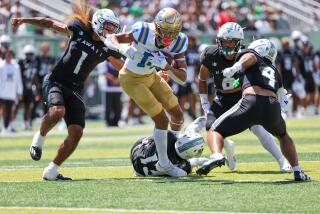Gang member convicted of murdering Los Angeles High football star
- Share via
His mother said a quiet prayer of thanks. His father dropped his head and rubbed his eyes.
Four years after Los Angeles High School football star Jamiel Shaw II’s death, the gang member accused of gunning him down because he was carrying a red Spider-Man backpack was convicted Wednesday of first-degree murder. Jurors deliberated for barely half a day before returning the guilty verdict against Pedro Espinoza, now 23.
The panel found to be true allegations that Espinoza committed the crime in association with a gang and that he personally discharged a firearm. At the end of a separate penalty phase, set to begin next week, jurors will decide whether Espinoza should receive the death penalty.
With hair slicked back and wearing dark-rimmed glasses, Espinoza stared blankly at jurors as the verdict was read, pursing his lips. After they left the courtroom, he glanced back at the spectators and smiled.
The verdict was read after Espinoza’s defense attorney, Csaba Palfi, asked the judge to throw out the case, complaining that two jurors had worn red on the last day of trial, which he contended showed bias against his client. Several of Shaw’s family members have worn red during the trial, telling reporters it was in protest against Espinoza.
Prosecutors had argued that Espinoza shot the 17-year-old Shaw in the belief that he was a Bloods gang member because he was a black man wearing a red backpack.
Judge Ronald Rose denied the defense’s motion, saying the argument was misguided and too late.
“It falls into the trap of the testimony in this case ... that color expresses an opinion, about who they are and what they believe in,” Rose said in his ruling. He also pointed out to Palfi: “Your tie is a variation of red today.”
Shaw was shot three doors down from his Arlington Heights home in March 2008 as he was walking back from a friend’s house after a day of shopping at the mall.
Espinoza, who had been released from custody just 28 hours earlier, asked Shaw, “Where are you from?” before shooting into his abdomen, then again into his head in an execution-like manner, prosecutors contended. Driving away from the scene, he boasted to a fellow 18th Street gang member, “I’m a killer,” according to testimony.
Shaw “was targeted for no other reason than the color of his skin and the color of his backpack,” Deputy Dist. Atty. Allyson Ostrowski told jurors in closing arguments this week.
The defense called the prosecution’s case weak, citing inconsistent witness testimony about the shooter’s attire and the absence of a murder weapon.
“There’s supposition, conjecture, guessing — there’s no proof,” Palfi told jurors, responding to a prosecutor’s contention that Espinoza had probably passed off the gun to another gang member.
Shaw’s slaying touched off an outcry over the Los Angeles Police Department’s practices regarding arrestees who are illegal immigrants because Espinoza was in the U.S. illegally.
Shaw’s family sought unsuccessfully to qualify a city ballot initiative — called “Jamiel’s Law” — that would have allowed police to arrest known gang members who are in the country illegally, even if they are not accused of another crime. After the verdict Wednesday, Shaw’s family said they wanted Espinoza to be executed.
“We want the death penalty bad. We want to set a precedent,” said the victim’s father, Jamiel Shaw Sr.
The senior Shaw said that in the years leading up to trial, his son was subject to a “smear campaign” by defense attorneys trying to portray him as a gang member rather than an innocent casualty of gang violence. His family says Shaw was not involved in gangs.
“He knew where he was going, he knew he had a future, he knew he was loved,” his father said.
His grandmother Tommie Shaw recounted how a few days before he was killed, Jamiel asked her for a hug. She was in a rush to leave the house, but he insisted, giving her a hug and a kiss and picking her off the floor as he always did.
That was the last hug she ever received from him.
“No other grandparent should have to go through something like this, because it’s not fair,” she said Wednesday.
More to Read
Sign up for Essential California
The most important California stories and recommendations in your inbox every morning.
You may occasionally receive promotional content from the Los Angeles Times.











